BEIRUT: Hezbollah said Wednesday that tens of thousands of its militants were ready to fight Israel, adding that the US election result would have no bearing on the war in Lebanon.
The Iran-backed group’s leader also warned that nowhere in Israel would be “off-limits” to attacks, as the Israeli military said about 120 projectiles had been fired across the border on Wednesday.
The Israeli military struck Hezbollah’s main bastion of south Beirut after issuing an evacuation warning.
Israel and Hezbollah have been at war since late September, when the Israeli military widened the focus of its war in Gaza to securing its northern border with Lebanon.
Hezbollah began launching low-intensity cross-border attacks on Israel last year, in support of its Palestinian ally Hamas following its October 7, 2023 attack.
Efforts to end the war in Gaza that was sparked by the Hamas attack have yet to bear fruit, and the war in Lebanon has killed nearly 2,000 people, according to an AFP tally of Lebanese health ministry figures.
“We have tens of thousands of trained resistance combatants” ready to fight, Hezbollah leader Naim Qassem said in a televised speech marking 40 days since his predecessor Hassan Nasrallah was killed in a strike.
The address was aired after Donald Trump’s victory in the US election was announced, but had been recorded earlier.
He said the result in the race between Trump and Vice President Kamala Harris would have no impact on any possible ceasefire deal for Lebanon.
“We don’t base our expectations for a halt of the aggression on political developments,” he said.
“Whether Harris wins or Trump wins, it means nothing to us.
“What will stop this... war is the battlefield” he said, citing fighting in south Lebanon and Hezbollah attacks on Israel.
Earlier on Wednesday, Hezbollah said it targeted a military base near Israel’s main airport close to commercial hub Tel Aviv, an attack that Israel’s Airports Authority said did not disrupt operations.
Earlier Wednesday, Lebanon’s official National News Agency reported Israeli air strikes on the Bekaa Valley in eastern Lebanon and the southern city of Nabatiyeh.
An AFP correspondent in the eastern city of Baalbek reported intense strikes in and around the city.
The speech was Qassem’s second since he was named Hezbollah secretary-general last week.
Israel is “betting on prolonging the war so it becomes a war of attrition... We are ready,” he said.
He also called for Lebanese sovereignty to be safeguarded in any truce talks.
Qassem demanded explanations from the Lebanese army after Israeli naval commandos seized a man from north Lebanon on Saturday who they said was a senior Hezbollah operative.
He said the operation was “a great offense to Lebanon” and a “violation” of its sovereignty.
On Tuesday, a Lebanese judicial official told AFP that Israeli commandos used a speedboat equipped with advanced devices capable of jamming UN peacekeepers’ radars for the operation, according to a preliminary probe.
The UN Maritime Task Force has helped the Lebanese military to monitor territorial waters and prevent the entry of arms or related material by sea since 2006, according to the mission’s website.
In Gaza, where the 13-month war has had a devastating impact, people were desperate for a solution and voiced hope Trump might be able to offer one.
Hamas’s October 7 attack resulted in 1,206 deaths, mostly civilians, according to an AFP tally of Israeli official figures.
Israel’s retaliatory campaign has killed 43,391 people in Gaza, a majority of them civilians, according to figures from the Hamas-run territory’s health ministry the United Nations considers reliable.
“We were displaced, killed... there’s nothing left for us, we want peace,” said Mamdouh Al-Jadba, who was displaced to Gaza City from Jabalia.
“I hope Trump finds a solution, we need someone strong like Trump to end the war and save us, enough, God, this is enough,” the 60-year-old told AFP.
Umm Ahmed Harb, from the Al-Shaaf area east of Gaza City, was also counting on Trump to “stand by our side” and end the territory’s suffering.
“God willing the war will end, not for our sake but for the sake of our young children who are innocent,” she told AFP.
Israeli Prime Minister Benjamin Netanyahu for his part feted Trump’s return as “history’s greatest comeback.”
“Your historic return to the White House offers a new beginning for America and a powerful recommitment to the great alliance between Israel and America. This is a huge victory!” Netanyahu said in a statement issued by his office.
The United States is Israel’s top ally and military backer, and the election came at a critical time for the Middle East.
While maintaining the steady flow of aid to Israel, US President Joe Biden’s administration had for months piled pressure on Netanyahu to agree to a truce.
Analysts say Netanyahu had been hoping for a Trump return, given their longstanding personal friendship as well as the former president’s hawkishness on Israel’s arch-foe Iran.
Hezbollah says tens of thousands of fighters ready to battle Israel
https://arab.news/pqhfg
Hezbollah says tens of thousands of fighters ready to battle Israel

- The Iran-backed group’s leader also warned that nowhere in Israel would be “off-limits” to attacks
- “What will stop this... war is the battlefield” he said, citing fighting in south Lebanon and Hezbollah attacks on Israel





























